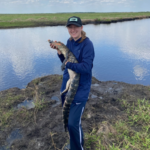
Hannah Starnes is a trainee in Dr. Scott Belcher‘s lab (Project 3). Hannah was spotlighted by NIEHS for her work in the Superfund Center.
What is the focus of your research at the NCSU SRP Center?
I study whether different human and animal proteins can bind to PFAS, and how strong those binding interactions are. More specifically, my research aims to uncover how the same protein in different species might bind to PFAS and to develop machine learning approaches that can predict protein interactions for thousands of untested PFAS compounds.
How did you become interested in this work?I became interested in lab work and human health research through a biomedical sciences program at my high school, but I had always been passionate about environmental health and climate change protections. I pursued research in both neuroscience and environmental studies in my undergraduate career, and eventually discovered toxicology. This led to my research in how chemicals impact the brain, and in the distribution and uptake of PFAS into tissue.
Tell us about a recent award and what it means to you.
Recently, I was awarded the NCSU Toxicology Founder’s Fellowship, which granted funding for my travel to Woods Hole, Massachusetts, to participate as a teaching assistant in the Marine Biological Laboratory Endocrine Disrupting Chemicals (EDCs): Hazards and Opportunities course. This award allowed me to improve my science communication and instruction of laboratory methods, attend courses taught by faculty studying EDCs, and gain hands-on experience in new techniques related to endocrine toxicology.
What factors have contributed most to your growth as a researcher throughout your time as an SRP trainee?
Collaboration with a diverse group of inspiring scientists and mentors has contributed the most to my development as a researcher. I have been so lucky to work with and receive training from many talented people, spanning the fields of toxicology, analytical chemistry, machine learning, endocrinology, epidemiology, and zoology. All of these scientists have unique perspectives that have broadened my thinking and deepened my motivation to do impactful work.
What is one piece of advice that you have for other SRP trainees?
My advice to other SRP trainees would be to challenge yourself to step out of your comfort zone — try working on projects that are out of your wheelhouse or seek advice from people with different expertise. You will learn a lot and may end up loving something totally new.
Click HERE to read more Trainee spotlights.
